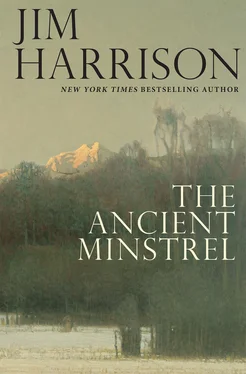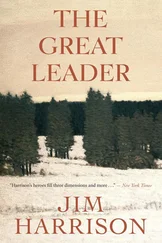“We never should have taken him to that piece of shit,” his father said angrily.
“I agree,” said his mother.
“We’re sorry son,” they said in unison.
When they got home he sat down at the kitchen table with his mother and weakly tried to help her clean the coat with kitchen washcloths and a brush. Instead he fell off his chair and knocked himself out. His father carried him to his bedroom and tucked him in. He vomited again and then slept, not awakening until the following morning.
This experience shaped itself into a nightmare that followed him the rest of his life. It disheartened him to the point that in his forties he went to a mind doctor. That helped for a year or so but then he was revisited. He never again was able to attend a stage performance of any kind. Eventually he also had to opt out of the habitual routine for poets, that of reading their poems out loud before an audience. Either the day before or late the night of the reading he would be revisited by the nightmare until the night whirled around him. And the feeling of nausea would return, certainly one of the most unpleasant feelings of the human animal. So he was high and dry, shorn of the renown, if not fame and extra money. He wasn’t really able to entertain an audience and had little interest in trying. The minstrel ogre would arise before a reading and he imagined that he had smeared himself in blackface.
It was darkly comic to think of one’s life as haunted by minstrels. They were ultimately fake humans, derisive not to speak of dishonest. And nearly all poets were liars in his opinion too. They couldn’t possibly be the men they were reading about with the usual catalog of fine qualities. After attending and giving at least a hundred poetry readings he could remember only one that struck him as a hundred percent genuine and honest. A poet named, simply enough, Red Pine read from an ancient Chinese poet he had translated, called Stonehouse. Red Pine read with quiet integrity just what he’d translated. Usually after a reading he was in a private snit and needed a drink, but now he walked down and looked at the harbor, his spine still tingling. The other true exception was Gary Snyder. He never wanted Snyder’s readings to end.
Early in the spring he took a ride thirty miles or so into the country, a weekly pilgrimage. In a village there was a small corner restaurant operated by a large old lady. She slow cooked a very large chunk of meat, at least a dozen pounds, all night long. It was the best ever in his memory. He had come late once at noon and gone without so he tried to get there at ten-thirty before the main rush. She served it as a hot roast beef sandwich with a scoop of mashed potatoes, homemade bread and a marvelous gravy, and a side of her own peppery corn relish. This dish is everywhere served at diners and truck stops as the way to get the most for your money, truly filled up. He had eaten the dish a lot as a woebegone young beatnik hitchhiking senselessly back and forth between San Francisco and New York City.
The ride over that day had been fine and warm with the first tinges of pastel green in the pastures. Even the cows looked happy, optimistic now that another wretched winter had passed. The old woman, Edna by name, started serving at 10:30 a.m. because many of her farmer customers had had their breakfasts at 5:00 a.m. before feeding and milking chores. Edna said, “I don’t sleep good since Frank died.” Frank, her husband, was known for raising good beef cattle and had died the year before from a heart attack while branding.
The poet pulled in early beside a single pickup and had time for a final cigarette before entering. Through his open passenger-side window he smelled something bad and heard scuffling. Within the caged back of the pickup there was a massive Hampshire sow. He was startled because the sow looked just like Old Dolly, his grandfather’s prime sow, but that was over fifty years ago and pigs rarely live beyond twelve years, so it couldn’t be her. Besides, if he remembered right, she was butchered when she went dry, her meat frozen and given to a social worker to distribute to the poor.
He went inside and said hello to the only occupant, an old farmer with trembling hands.
“Fine sow you got out there. A Hampshire I think?”
“Mostly Hampshire. Something else I haven’t figured out. The man I bought her from as a piglet years ago was moving back east. Maybe Duroc.”
“We had one that looked just like her way back when.”
“Good time to get back in the business if you grow corn. Pork is high. Hard to grow corn in Montana. Lucky for me my younger brother grows good corn over near Billings. She’s for sale.”
“How much?” He felt inspired. Why not?
“Three hundred bucks. Cash on the barrelhead. I’m retiring, selling out after sixty years of farming. Moving to town right here. We live too far in the country for my wife. In a weak moment I promised to take her to Hawaii when I retired. The sow’s going to farrow in two weeks. You can make your money back on her farrow. She’s always had at least ten piglets.”
“Sold,” he said and drew this man, Fred by name, a map to get to his place. “Give me three days. I’ve got to build a pen.” He counted out three C-notes from the secret corner in his wallet for emergencies. It was never safe enough from his wife and two daughters, both long gone and married to hardworking young men in this troubled economy.
On the way home he kept thinking it’s now or never and how he would tell his wife.
She had three horses, two of which didn’t like him one bit, and a pasture of ten acres with a white board fence. They had first boarded horses in a small stable with fencing they built themselves in the young, salad days of their marriage when they had bought a little farm for nineteen grand. Nothing cost that much those days, even a car. Now she had her own horses.
He stopped for a drink at a roadhouse. He only wanted one for courage but had a double and a beer chaser to make sure it worked. After all he didn’t need to tell her right away. Luckily he had enough lumber from an old chicken coop he had torn down when they moved in. In the beginning they had chickens for a couple of years but found them too irritating. Over the years, though, he had wanted pigs, especially when he was a little depressed over his mediocre writing career. During the truly melancholy period of his childhood after he lost his left eye he would sit outside his grandpa’s pigpen on a piece of stump and watch the creatures. Once after the sow had farrowed ten piglets Grandpa had moved her into an adjoining pen and let him sit in the pen with the piglets, in a dry corner away from the muck and shit. It was pure joy for his bewildered spirit. The piglets swarmed over him and loved having their ears and tummies scratched. He especially liked the little runt of the litter and on his request he was given the runt for his special care. He named her Shirley after a girl he liked in the second grade.
He was still in his pig trance when he stopped at a farm equipment and feed store. He cautioned himself to remain alert to signs of his bipolar problem without admitting to himself it was manic to buy a five-hundred-pound sow over lunch. He made a note on his car tablet to buy six cedar fence posts, a trough for eating, and a tank for water. He would build the pen against the wall and around the back door of his studio. He remembered to buy five bushels of feed, recalling that a healthy sow would eat a ton of feed in a year. He could hear the cash register singing when it occurred to him if she farrowed eight or ten or whatever he would also be feeding them after she weaned them. His dad had told him that after mating a sow would give birth in three months, three weeks, and three days or a total of 116 days. It was all so scientific. Or so he thought being largely ignorant of science except astronomy.
Читать дальше












